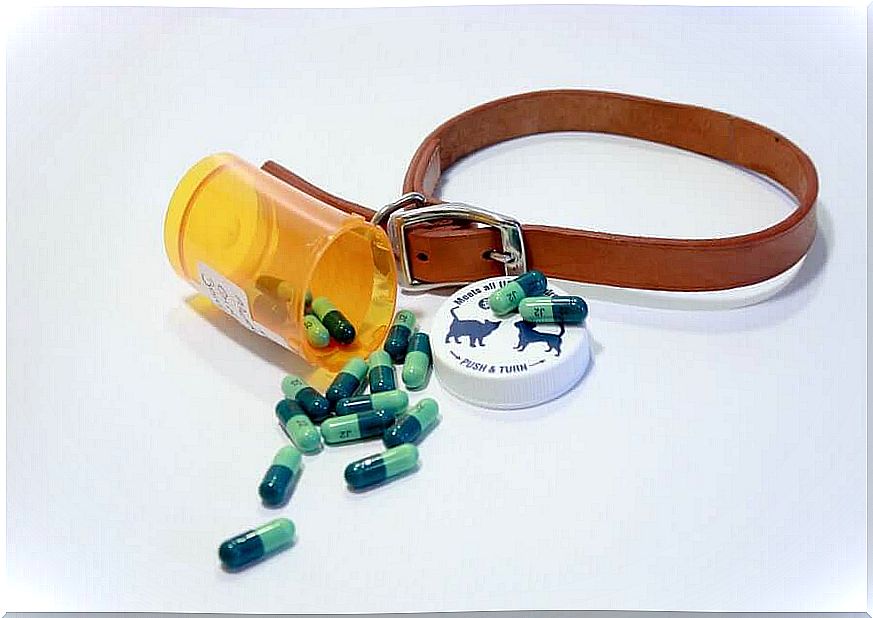Can Dogs Take Medication For Humans?

If there is one thing we would never recommend it is medication for your dog on your own. Anytime your dog has a health problem, your only option is to see a veterinarian. Because when a dog takes medication for humans, the consequences can be very serious.
In other words, your recklessness could cost you a lot more than visiting the vet. In the worst case, it could even cost your pet its life.
Although humans and dogs are mammals and our bodies function similarly in many ways, there are also great differences between animals and humans. Therefore there are specific drugs for humans and for animals. And the side effects of these products vary widely from species to species.
Anti-inflammatory drugs for humans are toxic to dogs
Ibuprofen, aspirin, and paracetamol are human medications that can be found in virtually every household. They are all used to relieve mild to moderate pain. In addition, ibuprofen is an antipyretic, which means that it is antipyretic.
Many people take such drugs, for example when they have a headache, sore muscles or a cold. However, it is precisely these mostly over-the-counter pharmaceuticals that are often taken too carelessly by many people.
And it is precisely this careless and sometimes excessive consumption of such readily available drugs that some people get the idea that they could also use them to treat their pets. However, you should know that this is extremely dangerous and in some cases can be fatal to your dog.

Medicines for humans exceed the lethal dose for dogs
The therapeutic amount of acetaminophen your dog can take is very small. Compared to humans, it is only 15 milligrams per kilogram of body weight. In addition, the lethal dose is also low, at just 150 milligrams per kilogram of body weight. But a human paracetamol tablet usually contains 500 milligrams of the active ingredient.
As a result, a single tablet of acetaminophen can exceed the lethal dose for small dogs. This means that if your dog weighs 5 kilograms and takes one tablet, this can already lead to severe poisoning in the animal. Without medical care, this can have serious consequences for your dog, and in the worst case scenario, it can even die.
How do drugs work in the body?
The speed at which the first symptoms appear depends on how long it takes the drugs to circulate through the bloodstream and reach the target organ. Medicines normally circulate through the blood until they are metabolized by the liver and filtered by the kidneys. The time it takes for these organs to metabolize depends, among other things, on the concentration of the product.
The metabolism of drugs does not occur at the same rate in every dog. For some, the metabolism can be so rapid that the drug never reaches a toxic concentration in the blood. However, if this process occurs very slowly in an animal, even very low or normal doses can produce toxic effects.
There are a number of factors that affect the rate at which a dog’s body metabolizes pharmaceuticals. The most important factors are the following:
- The pharmacological interactions with other medications your pet may be taking
- The genetics of the animal
- Any medical condition your dog may have

What are the symptoms of drug poisoning?
Some of the most common symptoms of drug poisoning include:
- Anorexia or loss of appetite
- Vomit
- stomach pain
- lethargy
- Dehydration
- Jaundice – the skin and mucous membranes turn yellow because the liver is no longer working properly
- Swollen feet and paws
- Bruising – they also occur with aspirin
- Increased body temperature – this is a typical sign of taking aspirin
- Cyanosis – parts of the animal’s body turn bluish due to a lack of oxygen supply to the blood
- It can also cause difficulty breathing or breathlessness – NSAIDs (non-steroidal anti-inflammatory drugs) are drugs that impede the supply of oxygen to tissues by clinging to proteins in the blood.
- Tachycardia
- coma
- In the worst case scenario, death can result from kidney or liver failure.
In addition, NSAIDs can also damage the gastrointestinal lining. This is because they inhibit prostaglandins, molecules that are responsible for protecting the intestines. These molecules produce a mucus that lubricates the surface and reduces gastric acid secretion.
Also, when dogs take medication for humans, due to the toxicity of the preparations to the animal, it can make the original problem even worse. As a result , it will be more difficult for the veterinarian to make a correct diagnosis. For all of these reasons, the only viable option for treating disease in pets is to see a veterinarian as soon as possible.








